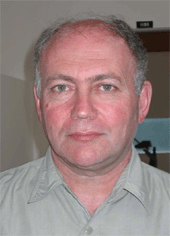If in a deterministic dynamical system a small variation of initial data produces a big variation of dynamics, the behavior of this system can be treated as a random one. This nonrigorous assertion known as a principle "small causes and big effects" is in the basis of the theory of deterministic chaos. Remarkably, such quasi-random behavior exists also in the systems which differ by an arbitrarily small perturbations from the systems with very simple (periodic, quasi-periodic) dynamics. Different types of perturbed dynamics have certain probabilities. Analysis of long-term dynamics leads to random walk problems. In the talk we shall discuss probability phenomena associated with passages through separatices and passages through resonances in perturbed dynamical systems. The theory which describes these phenomena has applications in different problems including problems of capture of satellites into resonances, of acceleration of charged particles, of chaotic advection of impurities.
|
